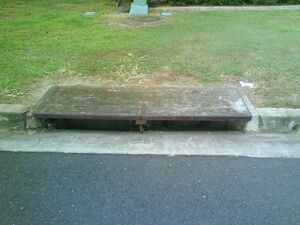1D Pits
Page Under Construction
Introduction
There are predominantly two types of stormwater pits (drains/gullies) used as inlets to collect overland runoff and transfer that water to the underlying drainage/culvert network; side inlets (side entry pits / kerb inlets) and grated inlets. Although there are various combinations of pits that can incorporate both features, the important thing to remember is that essentially any pit inlet can be modeled if the structure details are known and the performance can be calculated.
Pit types
- under construction
Real Life Examples
Some common pit types are shown below. Note: not all variations of side entry pits, grated pits, gully pits (pots) or any similar structure are displayed, the images are typical examples of what can be modeled as a 1D pit structure within TUFLOW.
UK Gully pits
- under construction
London, UK
Typical Kerbed Entry pits
- under construction

Linking
- under construction
Pit Inlet Depth-Discharge database
- under construction
border|300px border|300px border|300px border|300px
Pit search radius
Within the *.ecf the following command is required to have TUFLOW connect floating nodes into the 1D network where connectors are not snapped to channel ends:
Pit Search Distance ==xxx
Read GIS Network ==..\model\mi\1d_nwke_*****.MIF
The order of the Pit Search Distance command is important as it can be repeated multiple times with different values that are assigned to the 1d_nwke(s) below the Pit Search Distance command. There is an example on the TUFLOW Forum here that describes the setup of the commands within the .ecf.
To check if the Pit Search Distance is working as expected, import the *_nwk_C_check file to visually see if the pits are automatically connecting to a culvert. The image below is an example of the *_nwk_C_check file and the connections TUFLOW has made to each pit.
Any further questions please email TUFLOW support: support@tuflow.com
Back to 1D Hydraulic Structures